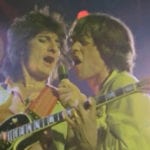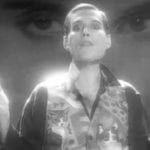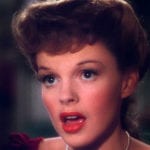 Mysteries
Mysteries  Mysteries
Mysteries  History
History 10 Surprising Stories About the Texas Rangers
 Humans
Humans 10 Philosophers Who Were Driven Mad by Their Own Theories
 Miscellaneous
Miscellaneous 10 Video-Game-Worthy Weapons and Armors from History
 Weird Stuff
Weird Stuff 10 Psychics Who Accurately Predicted Wartime Events
 The Arts
The Arts 10 Pieces of Art Inspired by a Broken Heart
 Health
Health 10 Science Fiction-Sounding New Medical Treatments
 History
History 10 Surprising Facts About the Father of Submarine Warfare
 Space
Space Ten Astonishing New Insights into Alien Worlds
 Weird Stuff
Weird Stuff 10 Bizarre Summer Solstice Rituals Still Practiced Today
 Mysteries
Mysteries Top 10 Haunting Facts About the Ghost Ship MV Alta
 History
History 10 Surprising Stories About the Texas Rangers
 Humans
Humans 10 Philosophers Who Were Driven Mad by Their Own Theories
Who's Behind Listverse?

Jamie Frater
Head Editor
Jamie founded Listverse due to an insatiable desire to share fascinating, obscure, and bizarre facts. He has been a guest speaker on numerous national radio and television stations and is a five time published author.
More About Us Miscellaneous
Miscellaneous 10 Video-Game-Worthy Weapons and Armors from History
 Weird Stuff
Weird Stuff 10 Psychics Who Accurately Predicted Wartime Events
 The Arts
The Arts 10 Pieces of Art Inspired by a Broken Heart
 Health
Health 10 Science Fiction-Sounding New Medical Treatments
 History
History 10 Surprising Facts About the Father of Submarine Warfare
 Space
Space Ten Astonishing New Insights into Alien Worlds
 Weird Stuff
Weird Stuff 10 Bizarre Summer Solstice Rituals Still Practiced Today
Top 10 Songs with Lyrics That Are Literally Nonsense
There are many songs with deep lyrics that listeners can pore over and analyze; then there are songs with lyrics that are utter nonsense. For the purposes of this list, songs with non-lexical vocables, which in English are sounds like “la la la” or “na na na,” don’t count. Neither does scat singing or doo-wop, both of which make use of melodic but meaningless syllables because they don’t sound like they should make sense. This means that songs like Hanson’s “MMMBop” (1997) and Little Richard’s “Tutti Frutti” (1955) are out.
The 10 songs on this list feature lyrics that sound like they should mean something but really don’t. Sometimes this is because real words are strung together in nonsensical combinations, and sometimes it’s because the words themselves are gibberish.
Related: Top 10 Weird Music Conspiracies
10 “Loser” by Beck
Beck’s unexpected breakthrough hit “Loser” (1993) was inspired by his experience playing gigs at small clubs and coffee shops. “I’d be banging away on a Son House tune, and the whole audience would be talking,” Beck recalls. “So maybe out of desperation or boredom, or the audience’s boredom, I’d make up these ridiculous songs just to see if people were listening. “Loser” was an extension of that.”
The refrain “I’m a loser, baby, so why don’t you kill me?” is often interpreted as a comment on the slacker culture of Generation X, but Beck says it’s not that deep and simply refers to his lack of rapping skills. The verses hold even less meaning, being made up of random combinations of words: “In the time of chimpanzees I was a monkey / Butane in my veins and I’m out to cut the junkie / With the plastic eyeballs, spray-paint the vegetables / Dog food stalls with the beefcake pantyhose.”[1]
9 “Smells Like Teen Spirit” by Nirvana
The lyrics of Nirvana’s “Smells Like Teen Spirit” are near-indecipherable because of Kurt Cobain’s slurred delivery, but the words don’t actually have much significance anyway. The title of the 1991 song came from Cobain’s friend Kathleen Hanna (of Bikini Kill), who drunkenly wrote “Kurt smells like teen spirit” on his wall one night. Cobain didn’t know that this was the name of a deodorant and took it for the now-iconic song title.
Cobain claimed that the song was about feeling “as if we’re teenagers because we don’t follow the guidelines of what’s expected of us to be adults. We still screw around and have a good time. It also has kind of a, like, a teen revolutionary theme to it too.” The lyrics are undeniably enigmatic, though, particularly the lines “A mulatto, an albino / A mosquito, my libido.”
Drummer (and future Foo Fighters frontman) Dave Grohl disputed Cobain’s interpretation. “Just seeing Kurt write the lyrics to a song five minutes before he first sings them, you just kind of find it a little bit hard to believe that the song has a lot to say about something,” he says. “You need syllables to fill up this space, or you need something that rhymes.”[2]
8 “Hook” by Blues Traveler
Most nonsense songs present themselves without comment, but Blues Traveler’s “Hook” calls attention to the fact that it makes no sense. The song opens with the lines: “It doesn’t matter what I say / So long as I sing with inflection / That makes you feel that I’ll convey / Some inner truth or vast reflection.” The 1994 song offers a scathing commentary on the formulaic and often insincere nature of many pop songs, drawing listeners in with a catchy hook but offering nothing of substance.
To reinforce this point, many illogical lines run throughout “Hook,” such as “Suck it in, suck it in, suck it in / If you’re Rin Tin Tin or Anne Boleyn / Make a desperate move or else you’ll win.” Not only is “Hook” a satire of a hit pop song, but it also ironically became a hit pop song itself, peaking at #23 on the Billboard Hot 100 and going platinum six times.[3]
7 “Mairzy Doats” by The Merry Macs
“Mairzy Doats” is a song written mostly in homophones, which are words that share the same pronunciation but have different meanings. The song’s refrain is “Mairzy doats and dozy doats and liddle lamzy divey / A kiddley divey too, wouldn’t you?” This is followed by: “If the words sound queer and funny to your ear, a little bit jumbled and jivey / Sing ‘Mares eat oats and does eat oats and little lambs eat ivy.’” The best-known version is by The Merry Macs, which went to #1 in 1944, but it was recorded many times, including by Bing Crosby.
The song was written and composed in 1943 after Milton Drake heard his young daughter singing a nonsense rhyme about animals. It reminded him of a rhyme from his childhood called “Mairzy Doats,” and with the help of Al Hoffman and Jerry Livingston, he set the novelty piece to music. The gobbledygook song has shown up in a few films and TV shows. It’s featured in Woody Allen’s 1987 film Radio Days and makes a couple of creepy appearances in David Lynch and Mark Frost’s Twin Peaks.[4]
6 “Haru Mamburu (Хару мамбуру)” by Nogu Svelo! (Ногу свело!)
Nogu Svelo! (Ногу свело!) are a Russian band that had a hit in the 90s with “Haru Mamburu (Хару мамбуру),” a song which, according to the band, “lives outside of time, space, and the framework of any particular style.” It’s sung in a made-up language, and “even the author has not been able to explain the meaning of the song for 25 years.”
Pseudo words that in English sound like “ramamba haru mamburu” are repeated throughout the song, but there are other lyrics every so often, like “a cheketu chejsi fari ju.” The song has two music videos: one is an animation created by Slava Ushakov, and the other is set during the medieval period.[5]
5 “Bob” by “Weird Al” Yankovic
2002 was a palindrome year (reads the same backward as forward), and it inspired “Weird Al” Yankovic to write a song entirely comprised of palindromes. After finishing it, he recalls thinking, “This is really just a random jumble, but it looks like it should mean something.” And then it dawned on him: “I’ve written a Bob Dylan song.”
The instrumental music on the track was then written to mimic Dylan’s style, and Yankovic dubbed the whole thing “Bob,” which is also a palindrome. The music video is a parody of the video for Dylan’s “Subterranean Homesick Blues.” Although the lyrics of “Bob” sound like they should hold some poetic significance, they’re totally meaningless. Take, for instance, these lines: “Do geese see God? / Do nine men interpret? Nine men I nod / Rats live on no evil star.”[6]
4 “Chacarron” by El Chombo
The music video for “Chacarron” by El Chombo was uploaded to YouTube in 2006 and soon went viral for its hilariously garbled lyrics. Here’s a sample of the incoherent words: “Ihni binni dimi diniwiny anitaime / Ihni binni dimi dini uan mor taime / Or ihni binni diniwiny ani taime / O Ihni binni dini one mor taime.”
Every so often an intelligible word is sung, like “play” or “flow,” but the vast majority of the song sounds like a very drunk man hilariously attempting to sing. The reggaeton song exploded in popularity, and there was even a push to get it to #1 on the UK Singles Chart (which failed; it peaked at #20). The song also became a meme when it was laid over a clip of Adam West as Batman dancing.[7]
3 “Prisencolinensinainciusol” by Adriano Celentano
Another song sung with made-up words is Adriano Celentano’s “Prisencolinensinainciusol” (1972). The lyrics are supposed to sound like English (spoken with an American accent) to people who don’t speak the language. It proved to be a hit in Italy and other European countries.
In a 2012 interview with NPR, Celentano explained, “I thought that I would write a song which would only have as its theme the inability to communicate. And to do this, I had to write a song where the lyrics didn’t mean anything.” He didn’t even write any lyrics down. Instead, he just improvised the fake words over the beat of the song.[8]
2 “The Ketchup Song (Aserejé)” by Las Ketchup
“The Ketchup Song (Aserejé),” by the Spanish girl group Las Ketchup, was inescapable in 2002. The song had both Spanish and Spanglish versions and topped charts around the world. It was then brought back to life 20 years later after going viral on TikTok. But what many listeners fail to realize is that the chorus is actually a nonsensical version of the refrain from The Sugarhill Gang’s “Rapper’s Delight.”
The chorus of “The Ketchup Song” is about a man called Diego singing along to the “I said-a hip, hop, the hippie, the hippie to the hip hip hop…” part of “Rapper’s Delight.” Except he doesn’t speak English, so instead sings “Aserejé, ja, de jé, de jebe tu de jebere…” in an attempt to imitate the lyrics. In a 2022 Rolling Stone interview, Pilar Muñoz, one of the three sisters in the band, likened it to non-Korean speakers singing along to K-pop songs: “Koreans would be laughing a lot at us because we surely wouldn’t be saying any of the words correctly.”[9]
1 “I Am the Walrus” by The Beatles
There are a fair few Beatles songs with perplexing lyrics, often born from LSD trips, but “I Am the Walrus” reigns supreme in that category. But although many of the puzzling lyrics of the 1967 B-side were indeed LSD inspired, the drugs weren’t entirely to blame.
Lennon was fed up with fans and critics overanalyzing everything he wrote, so he decided to write a song that deliberately defied interpretation. “Let the f**kers work that one out,” he reportedly said while penning it. A couple of acid trips and Lewis Carroll’s poem “The Walrus and the Carpenter” (1871) provided him with most of the lyrics. Unfortunately, he only later realized that the walrus was actually the villain of the poem, adding further confusion to the already confusing song.
The next time you hear “I am the egg man / They are the egg men / I am the walrus / Goo goo g’joob,” just remember that there is no hidden secret to solve—Lennon was purposefully writing mystifying gibberish to wind people up.[10]








